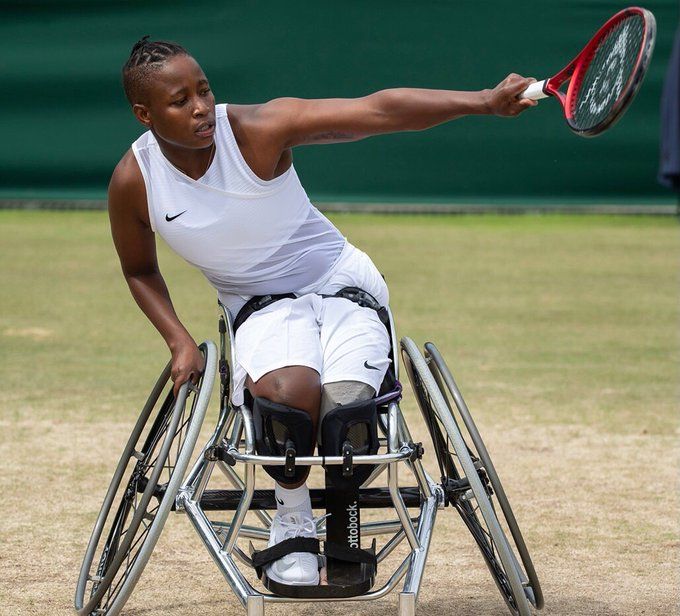Despite Lloyd Harris’s exit in the second round at The Championships, Wimbledon, all is not lost for South African tennis fans.
The South African’s reporter Amisha Savani spoke exclusively to wheelchair and quad wheelchair players Kgothatso “KG” Montjane, and Donald Ramphadi about their upcoming matches.
Wimbledon has two categories in the wheelchair draw. The wheelchair category is for athletes with a permanent impairment of one or both legs, but with normal arm function. Montjane will be competing in the ladies’ wheelchair singles and doubles draw.
The Quad category is for athletes with additional restrictions in the playing arm, which limits the ability to handle the racquet and manoeuvre the wheelchair. Ramphadi will be competing in the quad wheelchair singles and doubles.
‘Much to be positive about’
World No 11 ranked Montjane is due to play in both the singles and doubles wheelchair draw. Her first round singles match is against Great Britain’s Lucy Shuker, ranked No 14. In the doubles, she is partnered with world No 2 wheelchair player, Yui Kamiji of Japan.
Montjane reflected on her year to date, which had been tough: “due to getting closer but not really breaking through to get the results that I’m looking for, but just happy with the progress”.
She spoke about her recovery from her tendonitis, which she first sustained in 2002/2003: “it’s been a mental struggle to pick it up, but I’m still motivated to keep going”.
But there is much to be positive about.
In 2018, Montjane made history, by being the first black South African woman to compete at Wimbledon.
Savani congratulated Montjane for this feat, asking why Montjane thought it had taken so long for South Africa to make this history: “our history as a country maybe played a part in that, not having a lot of black people playing tennis at the highest level. I enjoyed the experience of playing in 2018, it was my first time playing on grass. I didn’t even know I was going to be the first one to ever do it”. She hoped to inspire the next generation of South African players to take up tennis.
Wimbledon holds many good memories for Montjane. The Championships changed her life, giving her a much needed career breakthrough at a time when she was undergoing financial struggles. Aside from making history that year, she entered her 2018 Wimbledon (her first Grand Slam) as a wild card, reaching the doubles and singles finals.
Montjane discussed her grass preparations on her favourite surface, which involve resistance-based training, “as grass is a heavy surface, everything depends on the arms, as we do quite a bit of heavy lifting to manoeuvre the chair, to make sure that it’s much better to push on grass”.
Looking forward to her doubles partnership with Kamiji, Montjane said both had won two grand slams together, reaching the Australian Open and Roland Garros finals together. She hoped they’d progress even further this Wimbledon.
Donald Ramphadi will also play singles and doubles
Meanwhile, singles world No 4 and doubles world No 8 ranked Ramphadi is due to play in both the singles and doubles Quad Wheelchair draw.
His first round singles match is against Israel’s Guy Sasson, ranked No 7. For the doubles, he is partnered with world No 4 quad wheelchair player Heath Davidson of Australia.
Ramphadi’s year to date has been good. He reached the Australian Open finals in the doubles, and the semis in the singles. Whilst he was unable to defend his title at Roland Garros, he had reached the quarter-finals in the quad singles at Roland Garros, and the semis in the doubles.
Looking to Wimbledon, Ramphadi told Savani said that grass was his most challenging surface, given the surface’s unpredictability: “it’s very hard for wheelchair tennis users to push on grass.”
As with Montjane, Ramphadi’s Wimbledon preparations had focused on upper body strength training: “the training has been good, so mentally, physically, I’m ready”.
Ramphadi spoke about wheelchair tennis growing as a sport: “we see things improving, which we are very happy about. We always want to see our sport growing” He hoped to see more tennis tournaments including wheelchair and quad wheelchair tennis in their draws”.
When asked what could be done to encourage more wheelchair tennis in South Africa, Ramphadi responded: “first of all, it’s the development side, which has not been doing well, especially after losing the big sponsor (AXA)”. Given that soccer and netball were more commonly played in schools in South Africa, tennis had less exposure. He hoped to help try to change this, to bring more interest to tennis.
Amisha Savani is reporting exclusively for The South African from the All England Lawn Tennis Club, Wimbledon

